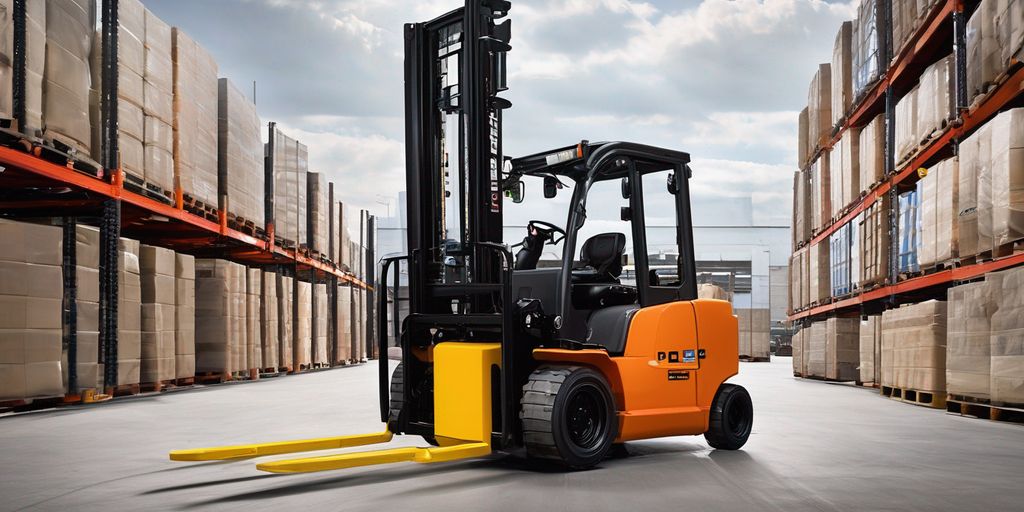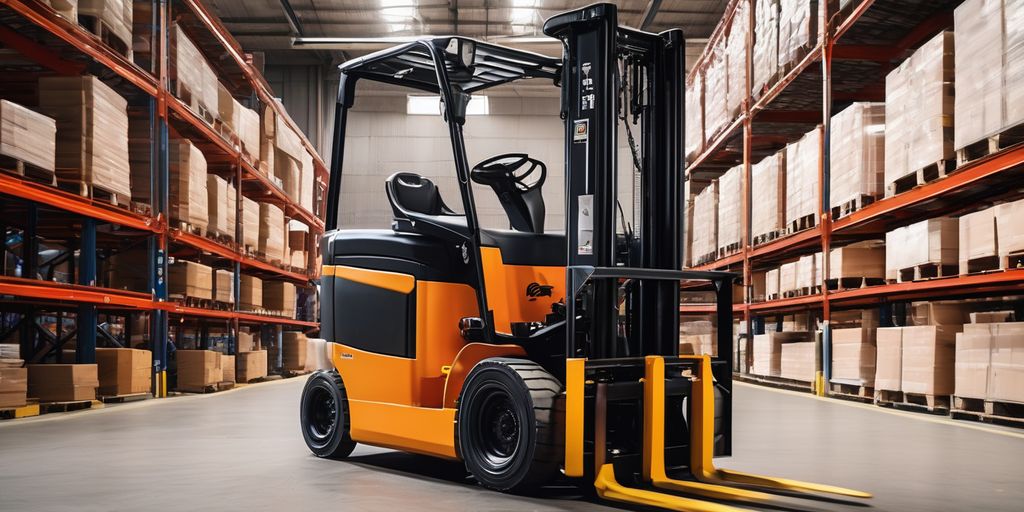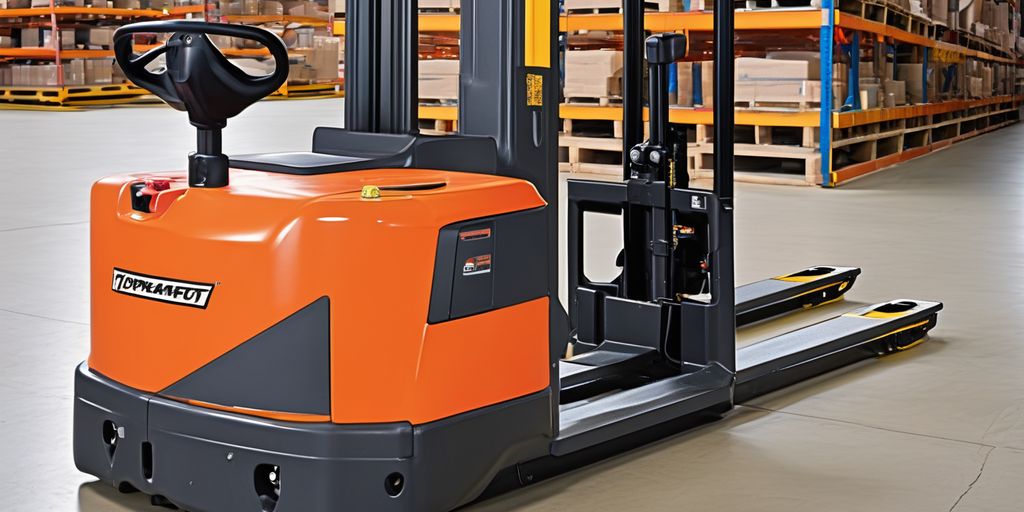Understanding the Different Fuel Types for Forklifts: Electric, LPG, and Diesel — overview
When choosing a forklift, the type of fuel it uses can make a big difference. The three main types are electric, LPG (liquefied petroleum gas), and diesel. Each type has its own set of benefits and downsides. This guide will help you understand these differences so you can pick the best forklift for your needs.
Key Takeaways
- Electric forklifts are quiet and good for indoor use but have limited battery life.
- LPG forklifts are versatile and can be used both indoors and outdoors but require regular fuel refills.
- Diesel forklifts are powerful and suitable for heavy lifting but produce more emissions.
- Electric forklifts are more environmentally friendly but can be more expensive initially.
- Choosing the right forklift depends on your work environment, load requirements, and budget.
Electric Forklifts
Electric forklifts are a popular choice for many businesses, especially those operating indoors. These forklifts run on batteries and are known for their efficiency and eco-friendliness.
Advantages of Electric Forklifts
Electric forklifts offer several benefits:
- No harmful emissions: Since they don't burn fossil fuels, they are better for the environment.
- Quiet operation: They produce less noise, making them ideal for indoor use.
- Lower operating costs: Electricity is generally cheaper than other fuels.
- Low maintenance: Fewer moving parts mean less wear and tear.
Disadvantages of Electric Forklifts
Despite their many advantages, electric forklifts have some drawbacks:
- Limited lifting capacity: They may not be suitable for very heavy loads.
- Battery life: Batteries need regular charging and can take time to recharge.
- Higher initial cost: They can be more expensive to purchase upfront.
Best Applications for Electric Forklifts
Electric forklifts are best suited for:
- Indoor environments: Warehouses, factories, and other indoor settings.
- Flat, smooth surfaces: They perform best on concrete or other even surfaces.
- Operations requiring low noise levels: Ideal for places where noise reduction is important.
When choosing between an electric tugger or a forklift, consider the specific needs of your business. Electric forklifts are a great option for many indoor applications, but it's important to weigh the pros and cons.
In summary, electric forklifts are a versatile and eco-friendly option for many businesses. They offer numerous advantages, but it's essential to consider their limitations and best use cases.
LPG Forklifts

LPG forklifts, also known as gas forklifts, are a popular choice for businesses that need a versatile and powerful machine. These forklifts can maintain 100% power throughout the day and are suitable for both indoor and outdoor work. Their engines are similar to car engines, making them reliable and easy to maintain.
Diesel Forklifts
Diesel forklifts are known for their high torque, which allows them to handle heavy loads and operate on rough terrain. They are ideal for outdoor and heavy-duty applications.
Comparing Fuel Efficiency
Electric vs. LPG
Electric forklifts are known for their superior efficiency. They generate zero emissions and can operate for three to six hours before needing a recharge. On the other hand, a 33-pound propane tank in an LPG forklift can last up to eight hours, depending on usage. This makes LPG forklifts more suitable for longer shifts without breaks for refueling.
Electric vs. Diesel
Diesel forklifts are more fuel-efficient compared to LPG models. A tank of diesel fuel will last substantially longer than an electric charge, allowing for extended operation times. However, electric forklifts offer sustainability and lower costs over time, making them a better choice for indoor environments where emissions are a concern.
LPG vs. Diesel
When comparing LPG and diesel forklifts, diesel models tend to be more fuel-efficient. They require less frequent refueling, which can save time and increase productivity. However, LPG forklifts provide flexibility and high performance, making them a viable option for various operational needs.
Choosing the right forklift fuel type depends on your specific operational needs and environment. Consider factors like efficiency, emissions, and cost to make an informed decision.
Environmental Impact of Forklift Fuels
Electric Forklifts and the Environment
Electric forklifts are known for their environmental benefits. They produce zero emissions during operation, making them ideal for indoor use and environmentally-conscious businesses. Additionally, they are quieter compared to other types, reducing noise pollution in the workplace. However, it's important to consider how the electricity is generated, as this can offset some of the environmental advantages.
LPG Forklifts and the Environment
LPG forklifts emit fewer pollutants than diesel forklifts, but they still produce emissions. They are more suitable for outdoor use or well-ventilated indoor areas. While they are not as clean as electric forklifts, they offer a balance between performance and environmental impact. Proper ventilation and personal protective equipment are essential when using LPG forklifts indoors to minimize health risks.
Diesel Forklifts and the Environment
Diesel forklifts are the least environmentally friendly of the three types. They produce significant emissions and are also the loudest, contributing to noise pollution. Diesel engines require more maintenance and consumable parts, which can add to their environmental footprint. Despite their drawbacks, they are powerful and efficient for heavy-duty outdoor applications.
When choosing a forklift, consider the environmental impact of each fuel type. Electric forklifts offer the cleanest operation, while LPG and diesel forklifts have their own sets of advantages and disadvantages. Assess your work environment and needs to make the best choice.
Cost Considerations

Initial Purchase Cost
When buying a forklift, the initial purchase cost is a major factor. Electric forklifts often have a higher upfront cost due to the price of the battery and the need for a charging station. On the other hand, LPG and diesel forklifts might be cheaper initially but come with other costs down the line.
Maintenance Costs
Maintenance costs can vary significantly between different types of forklifts. Electric forklifts generally have lower maintenance costs because they have fewer moving parts. However, they do require regular battery maintenance. LPG and diesel forklifts, while potentially cheaper to buy, often have higher maintenance costs due to more frequent servicing needs and the physical requirements of changing propane tanks.
Fuel Costs
Fuel costs are another important consideration. Electric forklifts typically have lower lifetime fuel costs since electricity is cheaper than LPG or diesel. However, the cost of electricity can vary based on location and usage. Diesel fuel can be more expensive than LPG depending on the area, and both require proper storage and handling.
When choosing a forklift, it's crucial to consider the lifetime costs of maintenance, repairs, and fuel, not just the initial purchase price.
Choosing the Right Forklift for Your Needs

Selecting the perfect forklift can be a daunting task, especially if you're new to the world of material handling. This section serves as a beginner’s guide to forklift types and their applications. We'll delve into forklift specifics, including electric, internal combustion, and rough terrain types for efficient operations in various environments.
Conclusion
Choosing the right fuel type for your forklift is crucial for your business. Electric forklifts are great for indoor use and are environmentally friendly. LPG forklifts offer a balance of power and emissions, making them versatile for both indoor and outdoor tasks. Diesel forklifts, on the other hand, are powerful and best suited for heavy-duty outdoor work. Each type has its own set of advantages and disadvantages, so it's important to consider your specific needs and work environment. By understanding these differences, you can make a more informed decision that will benefit your operations in the long run.
Frequently Asked Questions
What types of fuel do forklifts use?
Forklifts can run on various types of fuel, including electricity, liquefied petroleum gas (LPG), diesel, gasoline, compressed natural gas (CNG), and hydrogen. The most common ones are electric, LPG, and diesel.
What are the benefits of electric forklifts?
Electric forklifts are quiet, produce no emissions, and have lower operating costs. They are ideal for indoor use and in environments where air quality is important.
What are the downsides of LPG forklifts?
LPG forklifts can be noisy and produce emissions. They also require regular maintenance and a supply of LPG fuel, which can be a hassle to manage.
Where are diesel forklifts best used?
Diesel forklifts are best suited for outdoor use and heavy lifting tasks. They are powerful and can handle rough terrains, making them ideal for construction sites and large warehouses.
How does fuel efficiency compare between electric, LPG, and diesel forklifts?
Electric forklifts are generally the most fuel-efficient, followed by LPG and then diesel. However, the best choice depends on your specific needs and work environment.
What should I consider when choosing a forklift fuel type?
When choosing a forklift fuel type, consider your work environment, the type of tasks you need to perform, fuel availability, and overall costs including maintenance and fuel expenses.




Leave a comment
This site is protected by hCaptcha and the hCaptcha Privacy Policy and Terms of Service apply.